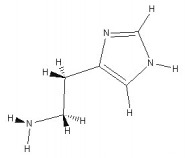The Role of Salt against Histamine
What is histamine
Histamine is the chemical compound C5H9N3. It is a physiologically active amine that can be found in plant and animal tissue, as well as in insect venom. Histamine's melting point is 83.5 degrees Celsius. This is why rinsing in hot water is an effective home remedy for histamine-infected skin. What hot water does is it draws out the histamine thereby stopping the itch. It takes the body 6-8 hours to regenerate the histamine for one to start itching again.
In the insect, histamine is present in the insect's photoreceptor cells as well as in its brain. Studies of histamine-immunoreactive (HAIR) neurons have been conducted in the following insect species: cockroaches, locust, crickets, honey bee, blowflies and fruit flies.
In humans, histamine is a mediator of inflammatory reactions. It is also a stimulant for the secretion of hydrochloric acid in the stomach. Histamine is released by the body when it needs help correcting a shortage of water, salt and potassium. The elemental order of importance to the body are oxygen, water, sodium and potassium. The absorption of sodium and chloride ions is the most important factor that promotes water movement. In a dehydrated state, histamine activity becomes exagerrated and released in enormous amounts. The mouth secretes mucus to keep from drying out. Sodium, a natural mucus-breaker, is secreted by the body to stop mucus build-up. This is why phlegm tastes salty.
The Role of Salt
If we take too much water and not enough salt for our water intake, the body releases histamine. Symptoms are runny nose and possibly congestion in your throat and lungs. Over-consumption of potassium-rich foods and juices and not enough salt to balance the potassium also results in runny nose and congestion of your throat and lungs. Too much salt intake will cause the release of excess histamine too. The lesson is not to take too much of one thing or another.
Salt is a natural anti-histamine. However, it is only effective when balanced with sufficient water intake. And potassium is in almost every food we eat. We need salt in all our food as a result of the potassium.
A good example is orange juice. Orange juice is loaded with potassium that our body cannot use without salt. When you drink orange juice and you did not take enough salt, histamine is released to take care of the problem. So, add salt to your orange juice to balance the actions of sodium and potassium.
Notably, it is saline water of 0.9% w/v of NaCl that is frequently used in intravenous drips for patients who cannot take fluids orally and have developed severe dehydration. One may say this is a substitute for dietary salt.




